Allison Messner is on a mission to help people live better lives outside. Allison is the cofounder and CEO of Yardzen, the leading online landscape design company and go-to source for outdoor living. Yardzen makes it easy to navigate the complicated process of outdoor renovation by providing a tech-enabled online studio for custom design, access to hand-picked and vetted local contractors for installation, and dedicated support to guide a renovation. Allison and her husband founded Yardzen in 2018 after losing their home’s outdoor space to wildfire. After navigating the complex and expensive landscape design process, they realized there had to be a better way to leverage technology to create a more delightful outdoor renovation experience. Before Yardzen, she was on the founding teams of several technology companies, notably Techcrunch Disrupt winner Layer and OpenDNS, which was acquired by Cisco Systems. Allison has been named to Apartment Therapy’s list of Design Changemakers, Forbes Next 1000 list, and Inc.’s Female Founders 100. Yardzen was named a Fast Company Most Innovative Company and Inc. Best Places to Work in 2022.
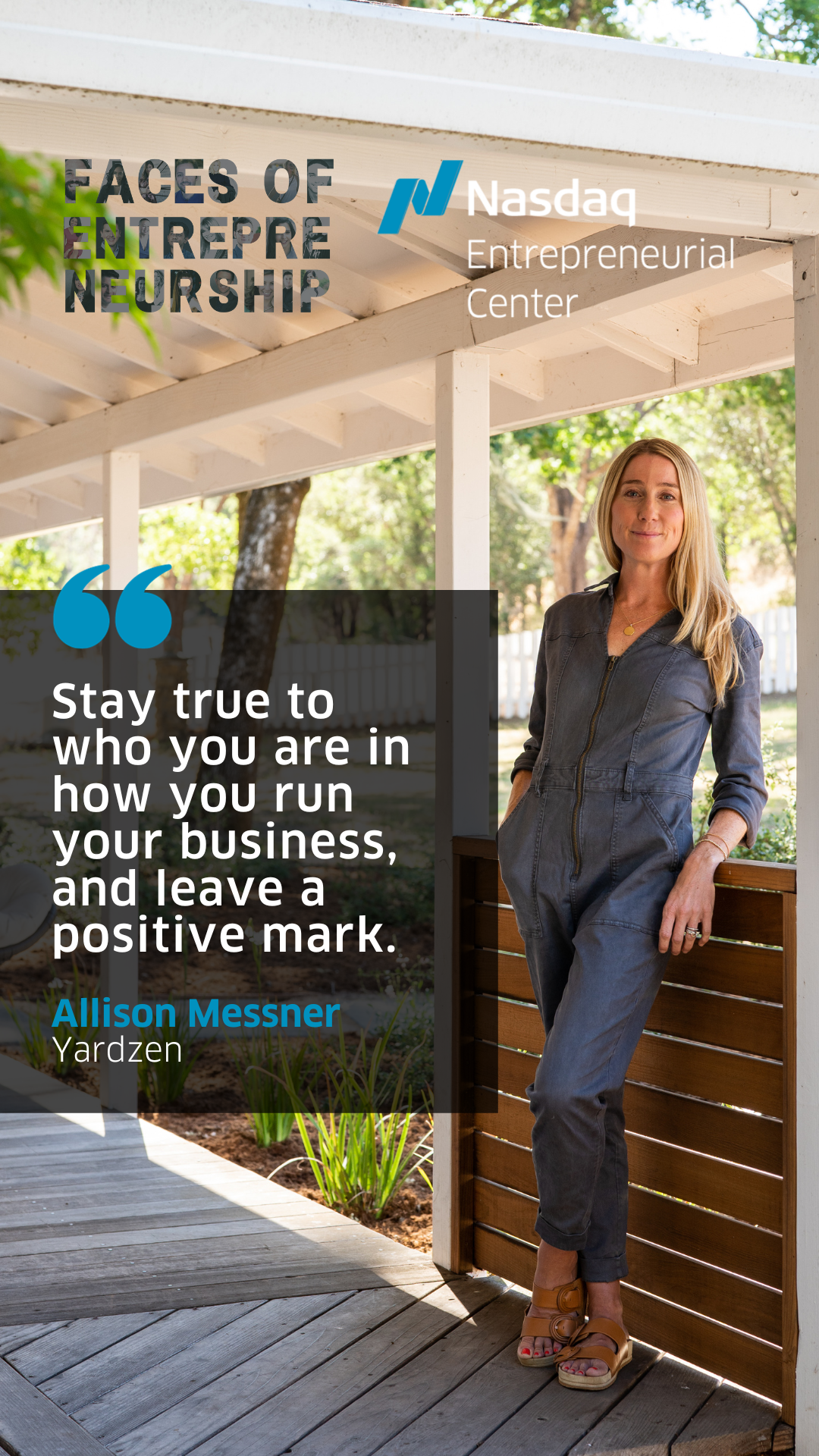 What does “entrepreneurship” mean to you?
What does “entrepreneurship” mean to you?
Allison Messner: For me, entrepreneurship is both a way of looking at the world and a creative process. Poking holes in the status quo and asking, “Can this be done in a better way?”
Tell us about your first experience with entrepreneurship.
AM: I started my first company – a cleaning service – at age seven and haven’t stopped since. Entrepreneurship has always been as much a mindset for me as a career. As an adult, there was never a question of whether I was going to start a company, just which idea I’d chase. Growing up in Silicon Valley there was entrepreneurship all around me. I’ve spent the bulk of my professional career building enterprise software companies where I was never the consumer. I taught myself to get into the headspace of the consumer in that world, but I always knew I wanted to build a company where I could be the consumer. That’s what’s been so fun about Yardzen. I’ve navigated lots of home renovations, so getting into the headspace of someone beginning a renovation journey came naturally.
What is your company’s origin story? What is the biggest reason you started your business? What did those early days look like and teach you?
AM: The idea for the company came about as a solution for a personal need. When the Tubbs wildfire ripped through Northern California in 2017, our hundred-year-old home in Calistoga was somehow spared despite many of our neighbors losing their homes. It was devastating to our community. After the flames were mostly extinguished we came home to leveled outbuildings, spot fires, melted gutters, and a yard that was now scorched earth. The rebuild process required a landscape architect, which was a path we’d never explored before. After talking to several, we learned designs alone would cost us tens of thousands of dollars, and the process of hiring an architect and then finding a contractor to install was unnecessarily complicated and time-consuming. We were met with an experience that felt ripe for innovation and the idea for Yardzen was born. We envisioned a design and build experience that introduced efficiency at the parts that could be done online and asynchronously, coupled with a managed process for the actual build of the design.
By leveraging even the basic technology on an iPhone, we created a solution that connects homeowners with talented landscape designers and contractors for a more delightful design and build experience, at a fraction of the price. By gathering all the necessary on-the-ground information from the client and providing geo-appropriate plants and materials to the designer, we could make fully custom, online design possible. And we assembled a network of vetted contractors to connect our clients with to build our designs.
What do you wish you knew when you started? Is there anything you would do differently?
AM: I’d flip that question and say I’m glad I didn’t know what I didn’t know when we started Yardzen. I’m not a landscape architect and I’m not a landscape contractor. I’m a busy homeowner who’s passionate about outdoor living, technology, and design. Sometimes being an outsider can be your greatest strength. Not being constrained by knowledge of the way things have always been done can be the single thing that allows you to look at a market or a service and imagine it in an entirely different construct.
What does “success” look like for you? We’d love to hear your biggest, boldest dream. What do you think will help you achieve it?
AM: Success is owning my own time and being able to say that I truly choose and enjoy how I spend it. Full stop.
What is your superpower as an entrepreneur? What is your proudest and darkest moment so far? Share a key high and a key low from your journey if you can.
AM: I wouldn’t quite call it a superpower, but I have a bias toward action when I have an idea and tend to just get started. That could look like choosing a company name, creating a logo, buying a domain, and setting up a website. Just moving forward and making it real. Once you build some momentum you find that pieces start falling into place.
One of my daily mantras is to always stay curious. What this looks like in my day-to-day life is that I always reserve time for personal outreach and making connections. I studied journalism in school and my first job out of college was a reporter at a small daily newspaper in Alaska. I’ve always been an inquisitive person, but that job taught me how to ask questions of anyone and everyone. This has been so important to launching and running a company. There are signals everywhere that can guide decisions if you listen and stay curious. Five years in I make time every day to respond to customer reviews, do cold outreach on LinkedIn to potential partners or talent that I think should join Yardzen, or hop on a design consult call to learn about our customer’s journey. ‘
A key high:
Just a few months after starting Yardzen in our living room, I sent a cold email to a reporter at the New York Times pitching her on our company and service. I followed up a few times without a reply, and then she finally wrote back with just a few words: “I’m writing a review of Yardzen.” The review came out glowing and overnight we went from just a few orders per day to an influx of clients from all over the country. It was a company-making moment for us.
What are your personal driving principles, your top values?
AM: Stay true to who you are in how you run your business, and leave a positive mark.
How have your personal principles and values shaped your company’s values and principles? Give us some examples.
AM: Growing up in California, I’ve always prioritized being outside and felt a strong connection to the natural world. We’ve built a company of like-minded people who also believe that life is best lived outside and who seek ways to support choices that do right by our planet. Every day our employees celebrate and connect over their personal relationships to nature – whether on a midday walk, taking a break to work in a backyard edible garden, or sharing tips on saving water in their own yard.
As I mentioned earlier, that natural propensity for asking questions and being curious has influenced a growth mindset at the company. It needs to be reinforced regularly, but everyone is encouraged to ask questions, poke holes, and embrace change and evolution. That’s the only way you can be innovative.
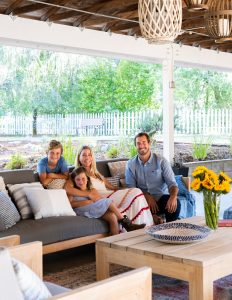 What’s it like to work alone or with your partners?
What’s it like to work alone or with your partners?
AM: My journey at Yardzen began with the closest partner I could ask for: my husband. We never thought in a million years that we would start a business together. We both had our own careers and had no intention of becoming cofounders. Now that we’ve done it though, we’ve learned so many lessons about one another, and most importantly have learned to respect each other’s skill sets and unique strengths. I’d heard this from other cofounders before, but it still rings true – you each must have your own lanes and consistently respect those boundaries.
Do you have a mentor? Tell us about what makes them valuable to you and your business. What role does mentorship play in your world (as a mentor or mentee)?
AM: I’ve had a solid group of mentors over the years, and I think what stands out to me is that most of the people have been my peers. There’s this idea that your mentor needs to be someone at a later phase of their career, more experienced, and someone that you need to proactively seek out in a defined mentor role. For me though, my mentors have been peers and colleagues who more often than not are at the same stage in their own careers.
I believe that this is especially true when you’re in the fast-paced startup world. Everything is moving so quickly that it can be incredibly beneficial to seek out those peers who, at a moment’s notice, are willing to dig in and help one another out with challenges, provide resources, and really just offer you a sounding board. I was lucky enough to find an amazing group of women – we all worked at different companies but in the same building early in my career.
Many entrepreneurs continue to perfect their daily routines to support their work and greater vision; would you mind sharing your morning routine or a regular ritual that grounds your work each day?
AM: My number one way to prevent burnout and stay inspired is to get outside. I actually dreamt up the idea of Yardzen while trail-running through the hills of Marin County where I live. I stopped in the middle of my run and started jotting down notes on my phone. I’ve always been an avid runner, but being an entrepreneur has encouraged me to make it a part of my daily creative process. If I have a challenge I need to work out, or I’m preparing for a big board meeting, I go on a run.
When you’re an entrepreneur, sometimes it can be hard to step away from what you’re building, but for me it’s essential. If I can’t make it out on a run, I’ll go on a quick walk around the block or even just take my one-on-one calls outside in the yard.
What are you reading or have read?
AM: I actually don’t read a lot of business books. I listen to a lot of business podcasts, but not so many business books. That said, “The Creative Act: A Way of Being” by Rick Rubin lit me up and inspired me so much that I read it without pause. The way he articulated the creative process spoke to me in a profound way and I’d recommend it to any entrepreneur or aspiring entrepreneur.
Where do you go for inspiration?
AM: I love to spend time outdoors with my family and find inspiration in nature. Fresh air helps me relax, and reset and keeps the creative process flowing for me. Specifically, trail running near my home in Marin County. This time is a non-negotiable for me. I make time regardless of how busy my schedule is. We also have two young kids and we’ve instilled in them an early love of camping, mountain biking, surfing, hiking, and fishing. We want them to also find inspiration in nature and make time for vacations that capitalize on being outside.
Do you have a favorite quote, mantra, or words of wisdom to get through the tough days?
AM: Trust your gut. It’s easy to second-guess yourself and your intuitions and assume someone else with more experience knows better. And you should listen to those people, also. Data is critical to decision making but you always need to come back to your gut instinct.
What is a problem that keeps you up at night?
AM: Unforgiving drought and wildfires one day. Historic flooding and warming global temperatures the next. It’s our new normal. And yet, we have an immense opportunity to make more responsible decisions to help people curb the effects of climate change. There are 130 million residential lots in the US. If everyone does a little – plants climate-adapted plants that require little water, and chooses building materials that are renewable and sustainable – we can make a collective positive impact. Establish habitat corridors, reduce or eliminate heat islands, and reduce water consumption. It’s no longer enough to do a yard renovation without regard for the climate impact of the plants and materials you choose. More and more, consumers are starting to embrace these sustainable yard practices, and we’ve seen some positive progress in municipal programs like cash-for-grass and water conservation rebates, which we’re so happy to see.
We founded the American Rewilding Project, which is our commitment to plant 2-3 habitat-supporting plants in every yard we design. So from the start, Yardzen has been educating and empowering homeowners to pursue practices like rewilding (more biodiverse, habitat-supporting planting), xeriscaping and drought-tolerant design, and lawn reduction. Now more than ever people are motivated to find actionable ways they can do their part.
How do you think about helping others through your work?
AM: It’s been incredibly rewarding to help people renew their connection with nature through their outdoor spaces. Countless academic studies prove the mental and physical health benefits of exposure to nature are well established. I love that we are helping people create beautiful, functional, and well-crafted outdoor spaces that in turn will encourage more time spent outside.
What advice do you have for fellow (and aspiring) entrepreneurs building and leading teams?
AM: You’re only as good as the people you surround yourself with. At Yardzen, we have a group of passionate and down-to-earth people who share the same vision. Across the board, nearly everyone – from software engineers and landscape designers to marketers and customer service agents – is passionate about being outside and helping our clients live a better life outside. Building that team and fostering a culture of openness and ownership has been one of my favorite roles as a founder. When you’re confident you have a company that’s going to solve a problem for people, you maintain your vision, and you commit to building the right team, you’ll make it work.
What kind of an entrepreneur do you want to be known as – as in, what do you want your legacy to be?
AM: As we continue to innovate and drive the residential construction industry forward, I’m inspired by the stories of both homeowners and contractors who share the ways Yardzen has improved their lives. Helping homeowners achieve their dream outdoor space and maximize their renovation investment. Helping contractors operate their small businesses more efficiently and successfully. That’s amazing and so incredibly motivating. But beyond that, if my legacy could be helping people spend more time outside, I’ll be happy. Being in greenspace not only leads to wellness for both body and mind but encourages connection. Connection to the natural world and to humanity – neighbors, friends, family – our yards are often the most accessible place to get outside and to gather. Two things we could all use a little more of right now.
Do you have someone you’d like to nominate to be profiled in our Faces of Entrepreneurship series? Please let us know by emailing media@thecenter.nasdaq.org or submitting your nomination using this form.
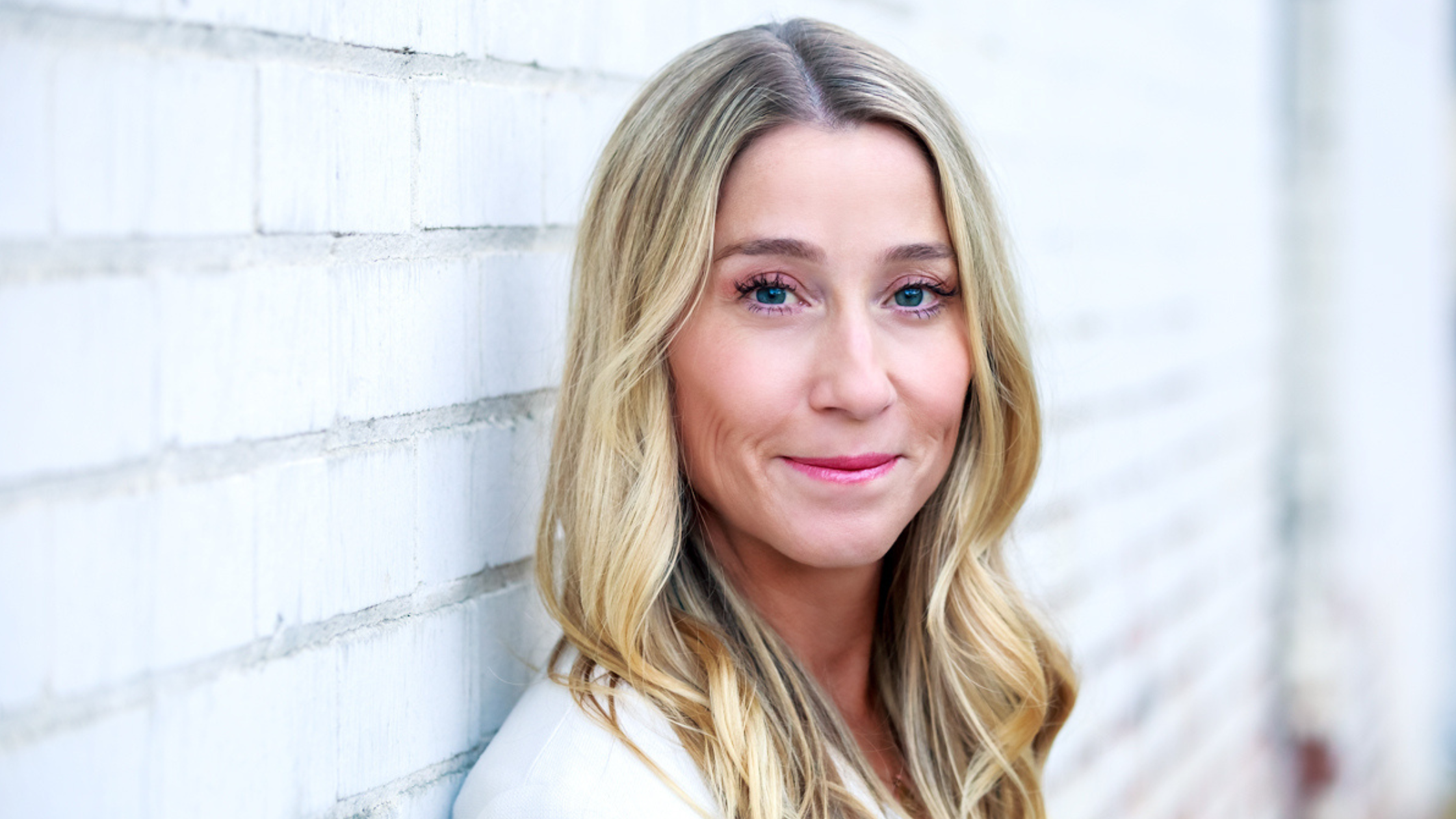
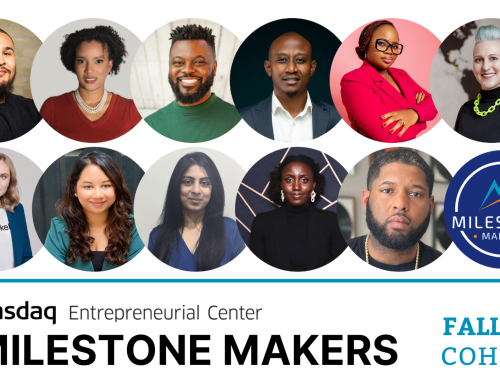
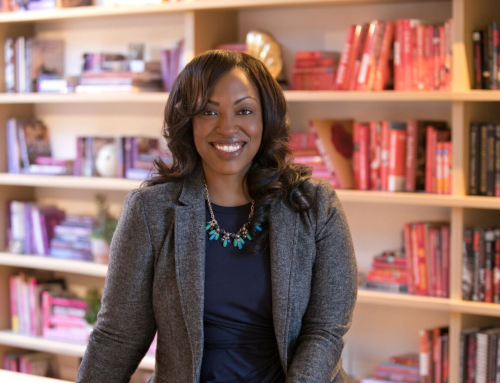
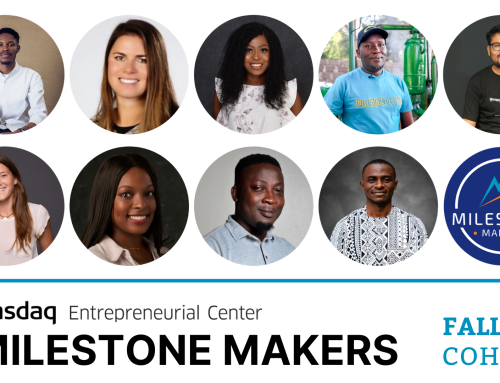
Invite a Friend
Close